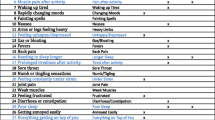Abstract
Background
Previous studies have shown fatigue and depression/anxiety to be highly associated with each other. The present study seeks to differentiate between fatigue and depression/anxiety and to investigate the familiality/heritability of fatigue using sib-pairs.
Method
The GENESiS study is a questionnaire study based in the United Kingdom that includes a five-item fatigue scale and four mental health measures (GHQ-12, EPQ-N, MASQ-AA, MASQ-HPA). Fatigue data from 10,444 sibling pairs were analysed using multivariate methods and model fitting techniques to investigate the familiality/heritability of fatigue and its relationship with the other mental health measures and physical health items.
Results
Fatigue correlated highly with GHQ-12 (r=0.62, p<0.001). A principal components analysis of the fatigue scale and the GHQ-12 revealed one main component which correlated highly with mental health items, and a smaller second component which correlated modestly with physical health items. Fatigue showed a modest sibling correlation (0.09, p<0.001), and multivariate modelling revealed evidence for familial effects on fatigue that were independent of the mental health measures.
Conclusions
Fatigue showed a strong relationship with both physical illness and mental health measures. Fatigue is modestly familial and at least part of this familial factor is not shared with mental health measures.
Similar content being viewed by others
References
Allison DB, Faith MS (1997) A proposed heuristic for communicating heritability estimates to the general public, with obesity as an example. Behav Genet 27:441–445
Buchwald A, Rudick-David D (1993) The symptoms of major depression. J Abnorm Psychol 102:197–205
Cathebras P, Robbin J, Kirmayer L, Hayton B (1992) Fatigue in primary care: prevalence,psychiatric comorbidity, illness behaviour and outcome. J Gen Intern Med 7:276–286
Chalder T, Berelowitz G, Pawlikowska T, Watts L, Wessely S, Wright D, Wallace EP (1993) Development of a fatigue scale. J Psychosom Res 37:147–153
Cope H, Mann A, Pelosi A, David A (1996) Psychosocial risk factors for chronic fatigue and chronic fatigue syndrome following presumed viral infection: a case control study. Psychol Med 26:1197–1209
Cox B, Blaxter M, Buckle A (1987) The Health and Lifestyle Survey. Health Promotion Research Trust, London
Croft P, Ridby A, Boswell R, Schollum J, Silman A (1993) The prevalence of chronic widespread pain in the general population. J Rheumatol 20:710–713
Eysenck SB, Eysenck HJ, Barrett P (1985) A revised version of the Psychoticism scale. Personality & Individual Differences 6:21–29
Falconer DS (1981) Introduction to quantitative genetics. Longman, Harlow, Essex
Farmer A, Scourfield J, Martin N, Cardno A, McGuæn P (1999) Is disabling fatigue in childhood influenced by genes? Psychol Med 29:279–282
Foster K (1998) Evaluating Non-response on Household Surveys. Office for National Statistics, London
Goldberg DP, Gater R, Sartorius N, Ustun TB, Piccinelli M, Gureje O, Rutter C (1997) The validity of two versions of the GHQ in the WHO study of mental illness in general health care. Psychol Med 27:191–197
Hickie I, Hadzi-Pavlonic D, Ricci C (1997) Reviving the diagnosis of neurasthenia. Psychol Med 27:989–994
Hickie I, Kirk K, Martin N (1999) Unique genetic and environmental determinants of prolonged fatigue: a twin study. Psychol Med 29:259–268
McDonald E, David A, Pelosi A, Mann A (1993) Chronic fatigue in general practice attenders. Psychol Med 23:987–998
Meltzer H, Gill D, Petticrew M, Hinds K (1995) The Prevalence of Psychiatric Morbidity among Adults Living in Private Households. HMSO, London
Merikangas K,Angst J (1994) Neurasthenia in a longitudinal cohort study of young adults. Psychol Med 24:1013–1024
Pawlikowska T, Chalder T, Hirsch SR, Wallace P, Wright DJM, Wessley SC (1994) Population based study of fatigue and psychological distress. Br Med J 308:763–766
Persson L, Sjoberg L (1987) Mood and Somatic Symptoms. J Psychosom Res 31:499–511
Watson D, Weber K, Assenheimer JS, Clark LA, Strauss ME, Mc-Cormick RA (1995) Testing a tripartite model: I. Evaluating the convergent and discriminant validity of anxiety and depression symptom scales. J Abnorm Psychol 104:3–14
Wessely S, Chalder T, Hirsch SR, Wallace P, Wright D (1997) The prevalence and morbidity of chronic fatigue and chronic fatigue syndrome: a prospective primary care study. Am J Public Health 87:1449–1455
Author information
Authors and Affiliations
Corresponding author
Rights and permissions
About this article
Cite this article
Williamson, R.J., Purcell, S., Sterne, A. et al. The relationship of fatigue to mental and physical health in a community sample. Soc Psychiatry Psychiatr Epidemiol 40, 126–132 (2005). https://doi.org/10.1007/s00127-005-0858-5
Accepted:
Issue Date:
DOI: https://doi.org/10.1007/s00127-005-0858-5




